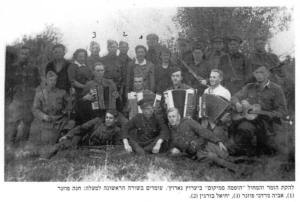This is an archive of prayers composed for, or relevant to, International Holocaust Remembrance Day. International Holocaust Remembrance Day is an international memorial day on 27 January, the day of the liberation of the Auschwitz Birkenau concentration camp. The day memorializes the unfathomable horror of the Nazi regime and its collaborators that resulted in the deaths of approximately seventeen million people including the genocide of six million Jews and a quarter million or more Roma. The Nazi atrocities include the killing of nine million Russians (including prisoners of war), 1.8 million Poles, over three-hundred thousands Serbs, a quarter million or more disabled persons, an undetermined number of political prisoners including seventy-thousand so-called asocials (LGBT persons), and nearly two thousand Jehova’s Witnesses. The day was designated by the United Nations General Assembly resolution 60/7 on 1 November 2005 during the 42nd plenary session. The resolution came after a special session was held earlier that year on 24 January 2005 during which the United Nations General Assembly marked the 60th anniversary of the liberation of the Nazi concentration camps and the end of the Holocaust. See here, for other Holocaust Memorial Days. If you have composed a prayer or prayer-poem for International Holocaust Remembrance Day, please share it here. Filter resources by Collaborator Name Filter resources by Tag Filter resources by Category Filter resources by Language Filter resources by Date Range
This is an undated El Malé Raḥamim prayer for the victims of the Shoah translated into Dutch for a Yom Kippur ne’ilah service, likely sometime soon after the Holocaust had ended. To this I have added an English translation for those not fluent in Dutch or Hebrew. We are grateful to Shufra Judaica (Ellie Fisher and David Selis) for sharing a digital copy of this prayer. . . . Categories: Tags: Contributor(s): A prayer for the victims of the Holocaust in Hebrew with English, Romanian, and Ukrainian translations. . . . Categories: Tags: Contributor(s): The most traumatic event in recent Jewish history is the Holocaust. At this time, the survivors of the camps are aging, and in the lifespan of people alive today it is likely that the last survivor will die. We say we must never forget what happened during the Holocaust, but if we think of it as a tragedy that happened to our ancestors we will forget. But it has been 3000 years since the Exodus from Egypt, and the Haggadah keeps its history vivid and alive. We are taught that in each and every generation we are to think of ourselves as having been slaves in Egypt. May it be that just as we never forgot the wonders of the Exodus, so too we never forget the horrors of the Holocaust, and continue to strive that such horrors may never happen again until all live in freedom and peace. . . . Categories: Tags: Contributor(s): There’s a lot of controversy over Yom haShoah as a date. One of the key issues is this: traditionally, the ways Jews mourn communal tragedies is through establishing a fast day. It’s forbidden to fast during the month of Nisan. It’s hard to pick any specific date to commemorate a tragedy as enormous as the Shoah, but one which seems appropriate to me would be 16 Marḥeshvan, the anniversary of Kristallnacht, the November Pogrom. This piyyut is a seliḥah for Kristallnacht, to be recited on 16 Marḥeshvan (or 15 Marḥeshvan on years like 5782 where the sixteenth falls on a Thursday). . . . Categories: Tags: Contributor(s): |



